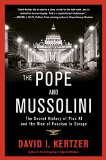Summary | Excerpt | Reviews | Beyond the Book | Readalikes | Genres & Themes | Author Bio
The Secret History of Pius XI and the Rise of Fascism in Europe

Critics' Opinion:
Readers' Opinion:
First Published:
Jan 2014, 576 pages
Paperback:
Dec 2014, 592 pages
 Book Reviewed by:
Book Reviewed by:
Linda Hitchcock
Buy This Book
The Socialists—whose numbers had been growing for decades—had hoped to ride the tide of popular anger to power. Workers occupied factories in Turin, Milan, and Genoa. Agricultural laborers struck, threatening the old rural landowner class. Only two years earlier, in 1917, a communist revolution had brought the Bolsheviks to power in Russia and destroyed the old tsarist order. Energized by their example, Italian protesters dreamed of a future when workers and peasants would rule.
But the Socialists had to face a violent threat of their own. Shortly after the war, Benito Mussolini, thirty-five years old and formerly one of the country's most prominent Socialists, founded a new fascist movement. It drew heavily on disaffected war veterans. Fascist bands soon sprang up in cities throughout much of the country. Its first recruits came, like Mussolini, from the left and shared his hatred of the Church and the priests. But Mussolini quickly turned from vilifying priests and capitalist war profiteers to denouncing Socialists, guilty of opposing Italy's entrance into the war. Recruits began streaming in from the extreme right.
From their headquarters in the cities of northern and central Italy, black-shirted fascists crowded into cars and rampaged through the countryside, burning down union halls, Socialist meeting rooms, and the offices of left-wing newspapers. Mussolini had little direct control over these squadristi, who were led by local fascist bosses dubbed ras. Beginning in 1919 and with increasing frequency and size over the next three years, the bands attacked Socialist officials and activists, beating them and forcing castor oil down their throats. The squadristi took sadistic delight in using the oil, which produced not only nausea but humiliating, uncontrollable diarrhea. Panicked Socialist mayors and town councilors fled, leaving a large swath of Italy under the control of fascist thugs.
These "punitive expeditions" also took aim at members of Italy's Catholic political party. The Popular Party was a new attempt by Italy's Catholics to compete for political influence. That the Vatican looked kindly on the establishment of a Catholic party in Italy was a new development. In 1861 Victor Emmanuel II, king of the Savoyard state based in Turin in the northwest, had proclaimed a new Kingdom of Italy, having annexed much of the Italian peninsula. Among the territories he acquired by a combination of rebellion and conquest were most of the lands long ruled by the popes. Only Rome and its hinterland remained as part of the Papal States. Then in 1870 the Italian army seized Rome as well, declaring it the new nation's capital. Pope Pius IX retreated to the Vatican, vowing not to leave its walls until the Papal States were restored.
The pope excommunicated the king and forbade Catholics to vote in national elections or run as candidates for parliament; he was hoping to gain international support to return Rome to papal rule. But as the nineteenth century wore on, this prospect seemed ever more remote. A new threat meanwhile arose with the rapid growth of the socialist movement. Popes from the time of Pius IX, in the mid-nineteenth century, had regularly condemned socialism. In 1891, in his famous encyclical Rerum novarum, Pope Leo XII had charged socialists with "working on the poor man's envy of the rich." He blasted their proposal to abolish private property. By the dawn of the new century, the Vatican had made clear that socialism was one of the Church's most formidable enemies.
With the expansion of the right to vote in Italy in the early twentieth century, the Vatican's voting ban became untenable. Unless the Church did something, the socialists would likely come to power. In November 1918 Luigi Sturzo, a Sicilian priest, met with Vatican secretary of state, Cardinal Pietro Gasparri, to discuss his plans for a Catholic party, to be called the Italian Popular Party. It would offer a progressive platform intended to lure peasants and workers away from the socialists. It was formally launched early the following year with Benedict XV's blessing. By 1922 it was among the country's largest.
Excerpted from The Pope and Mussolini by David I. Kertzer. Copyright © 2014 by David I. Kertzer. Excerpted by permission of Random House, a division of Random House LLC. All rights reserved. No part of this excerpt may be reproduced or reprinted without permission in writing from the publisher.





The House on Biscayne Bay
by Chanel Cleeton
As death stalks a gothic mansion in Miami, the lives of two women intertwine as the past and present collide.

The Flower Sisters
by Michelle Collins Anderson
From the new Fannie Flagg of the Ozarks, a richly-woven story of family, forgiveness, and reinvention.

The Funeral Cryer by Wenyan Lu
Debut novelist Wenyan Lu brings us this witty yet profound story about one woman's midlife reawakening in contemporary rural China.
Your guide toexceptional books
BookBrowse seeks out and recommends the best in contemporary fiction and nonfiction—books that not only engage and entertain but also deepen our understanding of ourselves and the world around us.